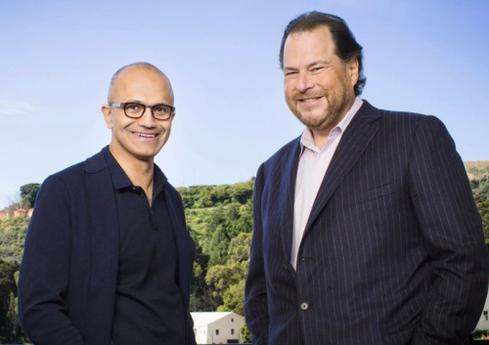Microsoft, Salesforce.com Make Nice, Marry AppsMicrosoft, Salesforce.com Make Nice, Marry Apps
Salesforce apps will work with Office 365, Windows, Windows Phone. Microsoft keeps using ExactTarget. But don't expect Salesforce apps on Azure.


Apple WWDC 2014: 9 Things To Expect
Apple WWDC 2014: 9 Things To Expect (Click image for larger view and slideshow.)
Microsoft and Salesforce.com announced a partnership on Thursday that promises tight integration between Salesforce CRM applications and Microsoft's cloud-based Office 365 productivity apps. In addition, a new Salesforce1 App for Windows and Windows Phone 8.1 will be previewed this fall with general availability expected in 2015.
The high-profile deal was announced in a joint conference call with Microsoft CEO Satya Nadella and Salesforce chairman and CEO Marc Benioff.
"This partnership is about extending the power of Salesforce, the world's number-one CRM platform, with Microsoft, the world's mostly widely used productivity solutions," said Benioff, who has previously been a frequent and caustic critic of Microsoft.
[Want more on Microsoft's recent deal with SAP? Read Microsoft Brings SAP Apps To Azure Cloud.]
Interoperability will enable joint customers to access, share, edit, and collaborate on Office content from within Salesforce and on Salesforce1 using Office Mobile, Office for iPad, and Office 365. A new Salesforce App for Outlook will be able to draw contact information from the email app, while Microsoft Excel and Power BI users will be able tap into and analyze data from Salesforce apps.
The integrations will "remove a lot of the friction that exists" between Salesforce and Office apps, said Nadella. And unlike third-party integration options that have been available at an extra cost, the new ties will be free to business subscribers to Office 365, Nadella said.
In a second aspect of the partnership, Microsoft announced it has renewed its commitment to use the ExactTarget Marketing Cloud for internal digital marketing -- an agreement that predated Salesforce.com's $2.5 billion, 2013 purchase of ExactTarget. In addition, Salesforce.com has agreed to keep running the underlying infrastructure of the ExactTarget Marketing Cloud on Microsoft SQL Server. Benioff said Salesforce will use Microsoft's Azure cloud for testing and development of ExactTarget applications.
As recently as January, Benioff described Microsoft as "a follower, not a leader," and he said the selection of a new CEO might be "too little, too late" to revive the company. But that was before the February selection of Nadella as the replacement for former CEO Steve Ballmer. Benioff cited the acquisition of ExactTarget and the choice of Nadella as two reasons for his change in tone and catalysts for the partnership.
"I've always wanted to have a closer relationship with Microsoft, and now we do because all these things have come together," he said.
The partners did not disclose the terms of the deal. They also did not explain why Salesforce.com apps will not be made available on the Microsoft Azure cloud -- a rumored aspect of the deal that was widely reported before Thursday's announcement. An Oracle-Microsoft partnership announced last year made Oracle apps available on Azure. And SAP apps will hit Azure in June through a separate deal announced earlier this month. But many Oracle and SAP apps started out on-premises, with versions running on Windows and SQL Server. Salesforce apps have never run on premises or on Microsoft infrastructure.
Why is Microsoft building closer ties with Salesforce when it competes with its Microsoft Dynamics CRM business? "There will be some areas that we will compete in," Nadella acknowledged, citing the inevitability of conflicts when operating a broad platform. Interoperability between popular applications is "what our customers demand of us."
Microsoft's continued use of ExactTarget is also somewhat surprising. In 2012 Microsoft acquired MarketingPilot as the underpinning for Microsoft Dynamics Marketing and campaign-management enhancements introduced as part of Dynamics CRM Spring 2014.
Supporting company strategy, Kirill Tatarinov, president of the Microsoft Business Solutions Division responsible for Dynamics apps, wrote in a blog that the deal is "an inspiring example of how two companies that compete vigorously on many fronts can also find ways to come together to benefit our customers." Tatarinov is clearly resigned to accepting the realities of why the deal is taking place.
"The reason that this relationship works is because Microsoft's core strategy is Windows and Office; that's where its revenue comes from," Benioff said. "Our core strategy is our CRM apps; that's where our revenue comes from. We both want to grow our revenues."
Our information Elite 100 issue -- our 26th ranking of technology innovators -- shines a spotlight on businesses that are succeeding because of their digital strategies. We take a close at look at the top five companies in this year's ranking and the eight winners of our Business Innovation awards, and offer 20 great ideas that you can use in your company. We also provide a ranked list of our Elite 100 innovators. Read our information Elite 100 issue today.
About the Author
You May Also Like






